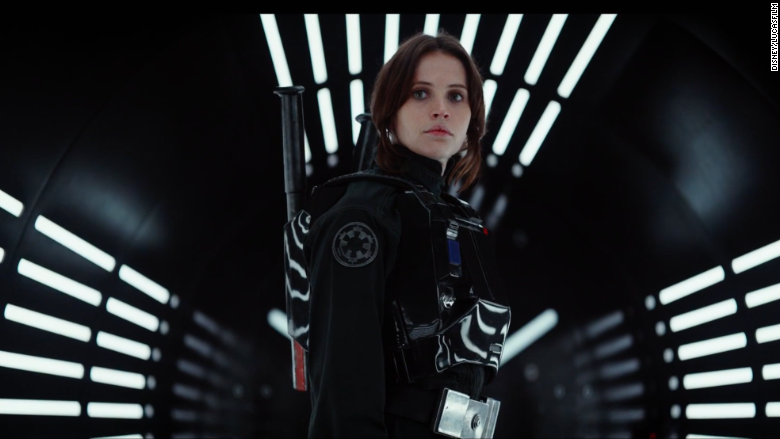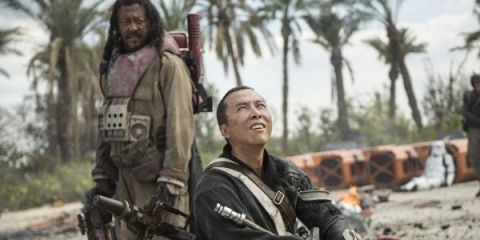Perhaps the most surprising and welcome thing about Gareth
Edwards’ “Rogue One: A Star Wars Story” is how dark it is, not just in the
context of the “Star Wars” saga but also in context of big budget franchise
films. Edwards’ film is a prequel—setting up the events of “A New Hope.” We
follow the rebellion as they embark on a risky mission to steal the Death Star
plans.
“Rogue One” is a bleak and gritty old-school war film set in
the “Star Wars” universe. There’s plenty of hope in the hearts and minds of the
characters, a key ingredient in rebellions and revolutions, but there’s a lot
of pain and suffering as well. As all of the successful (and unsuccessful) revolutions
in history have taught us, much has
to be sacrificed for serious change. Edwards doesn’t shy away from immersing us
in the tragedy and melancholy of warfare.
The stakes are high in “Rogue One”—lives are lost and a lot
more lives are at risk. The conclusion is almost shocking in how downbeat it
is. Outside of “The Empire Strikes Back,” “Rogue One” is the dourest “Star
Wars” film to date. This bleakness raises the stakes in “Rogue One” and also
adds considerable weight to “A New Hope”—knowing now about all the destruction
and suffering that went on to get these plans into the hands of the rebel high
command adds a compelling and gritty layer of depth to the original trilogy.
“Rogue One” gets away with this bleaker tone because it’s a
standalone feature. It’s a complete, self-contained vision that isn’t beholden
to future films the way a “Marvel Cinematic Universe” (MCU) picture is. The
producers behind the MCU are always thinking three or four movies ahead,
eliminating the element of surprise and preventing anything substantial
story/character wise from going on. The death of a major character can’t happen
because that character has already been confirmed for a future installment.
This frustrating inevitability has plagued nearly every Marvel film.
“Rogue One” is a prequel to “New Hope” but it has a new set
of characters. Established “Star Wars” characters show up in supporting roles
and others are mentioned in passing but the movie’s focus is squarely on fresh
faces, providing a sense of uncertainty and tension to the proceedings. The
broad strokes may be known (we know that the Death Star plans will be stolen)
but the fate of these new characters is not certain; anything can happen to
them. As a result of all this, “Rogue One” is able to take risks that a film like
“Captain America: Civil War” can’t. It can be bleak. Major characters can die,
which makes for a more substantial and satisfying flick.
Edwards and screenwriters Chris Weitz and Tony Gilroy
assemble a lively and diverse cast of characters— coming from various
backgrounds but all equally angry and scarred by the empire. There’s the intergalactic outsider/criminal
Jyn Erso (Felicity Jones, scrappy and assured), who emerges as a leader, and
the rebellion soldier Cassian Andor (Diego Luna). Additionally, there’s K-2S0
(Alan Tudyk), a wisecracking imperial droid that’s been rewired. He’s
essentially a drier, more militarized version of C3PO and that’s OK with me.
Forest Whitaker shows up as a scruffy, grizzled leader of an independent rebel
group and an old friend of Jyn Erso. Whitaker’s performance verges on
overwrought at times but he has gravitas and his thousand-yard stare is
perfectly suited for this battleworn figure. Martial artist and Hong Kong
action star Donnie Yen plays a witty blind intergalactic monk and fellow
international star Wen Jiang plays his right hand man.
For all the bleakness, the film’s hopeful message of unity
through diversity is resounding and timely. We must come together in spite of
our differences to defeat tyranny.
From a visual standpoint “Rogue One” is staggering. Edwards
has a knack for staging breathless, intense action sequences that take
advantage of the big screen format. “Rogue One” is a big film and Edwards is a
master of showing perspective; he and cinematographer Greig Fraser compose some
truly breathtaking scenes/shots: The vastness of The Death Star as its shadow
consumes a tiny Star Destroyer, a shot of the ATAT (a mighty four legged tank) shown from the
perspective of fleeing soldiers during a beach battle.
I particularly love the way Edwards stages the scenes in
which the Death Star shows off its destructive powers—on the planet that’s been
targeted, a massive, slow moving mushroom cloud of terror and destruction
devouring the ground bit by bit, seen from the point of view of the poor
inhabitants who will be affected. This attention to size and perspective emphasizes
the danger and dread pulsing throughout the film. The Empire is menacing and
lethal.
In terms of flaws, the beginning of “Rogue One” is somewhat
chaotic and jumbled as it jumps around from planet to planet, introducing its
large ensemble and various plot strands. And the film suffers from some cheesy
dialogue, something that’s never been strong in any “Star Wars” films, unfortunately.
It’s not as fun as “The Force Awakens” and the characters aren’t as easily
relatable as the central trio in that film but “Rogue One” is also a much different,
darker “Star Wars” movie, a welcome addition to the cannon.
B+





Rogue One is an Hollywood Movie which was released in December 2016. Movie story based on Alliance who makes a risky move to steal the plans for death star. Film made more than $529,929,733 till now.
ReplyDeletenotext
ReplyDeletenotext
notext
notext
notext
notext
megashare9
zmovies
megashare9.tv